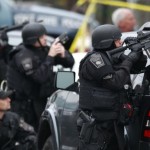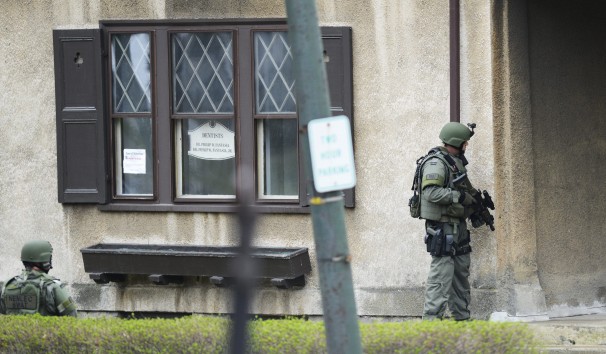In Boston and its suburbs, nearly unprecedented shutdown is surreal
By Doug Struck and Kevin Sullivan, Published: April 19 E-mail the writer
By order of the state, a public transit system that serves more than 1.3 million riders a day was padlocked. Amtrak trains were suspended between Boston and New York. Businesses, offices and some of the world’s greatest universities were shut. Taxis were ordered off the streets for part of the day. Residents were instructed to stay inside.
“Even in a big snowstorm, you usually see a plow or a couple of nitwits walking along. Something. But there’s nothing. It’s an eerie sight,” said LeBlanc, who ran the Boston Marathon on Monday and was stopped by police a half-mile before the bombed-out finish line.
John Fox, the official historian of the FBI, said that the shutdown of such a major city was virtually unprecedented in recent U.S. history. He said the aftermath of Sept. 11, 2001, attacks was far bigger, knocking New York and Washington on their heels and clearing the airspace over the entire United States.
But beyond that, Fox said, a city shutdown has “only happened on a smaller scale.”
The Oklahoma City bombing in 1995 (which happened on April 19, Friday’s date) was far deadlier and devastated the city center. But the government didn’t order a far-reaching lockdown.
Other manhunts and events have terrorized and paralyzed cities, including in 2002 during the Washington sniper attacks. But rarely, if ever, has a large U.S. urban area come to such a complete and utter halt as happened Friday in Boston.
Fox said the closest recent parallel might be in London after the July 7, 2005, transit system attacks that killed 52 passengers and four bombers, and injured more than 700 others.
London was badly disrupted, with trains and buses out of service, and schools and many businesses were closed. But the city was back on its feet almost immediately, with a sentiment summed up by Ian Blair, then the head of Scotland Yard.
“Residents should not answer the door unless it is a police officer, and are advised to stay away from windows,” a notice from the governor’s office said. “All businesses in these towns will remain closed until further notice. People should not congregate outside. Residents and businesses should monitor media for further information.”
“I’m looking at all of these SWAT guys and I’m thinking to myself, if they ever want to put down an insurrection, they have an army here,” he said. “You don’t realize how many cruisers there are.”
Twitter, Facebook and other social-networking sites buzzed with news of the Boston shutdown.
One resident of Cambridge tweeted: “I fell asleep to the sound of helicopters overhead and woke up to this on my front door- whoa.”
She attached a photo of a piece of paper — dated April 19 at 6:39 a.m. — that said: “This is an important message from the City of Cambridge: Due to the ongoing police investigation in Watertown and the surrounding area, police are advising residents to shelter in place.” It added, “Please stay vigilant and call 9-1-1 immediately if you witness any suspicious activity.”
Norfolk Street in Cambridge, where the Tsarnaev family lives, bristled with activity as police surrounded the house and cleared the street.
When police knocked on Vanessa Buttolph’s door and told her to leave, she grabbed what was dearest to her: her viola.
“It’s the most important thing I own,” the musician, 24, said.
The police also knocked on the door of Tim Fiedler, 23, who lives on Norfolk Street.
“When big men with guns and bulletproof vests order you to get out, you get out,” he said.
Although almost everyone complied with the shutdown orders Friday, a few people staged quiet rebellions. Shortly after noon, a sole jogger ran along Memorial Drive on the banks of the Charles. One other person rode a bike nearby.
In the otherwise shuttered Harvard Square in Cambridge, Paul Spagnuolo manned a newsstand that remained open for business in the rushless morning rush hour.
“We don’t let anything, even crazed bombers, get in our way,” he said.
Later in the morning, his stand was closed and empty.
Sullivan reported from Washington. Mary Beth Sheridan in Cambridge, Dan Keating in Boston and Masuma Ahuja in Washington contributed to this report.

